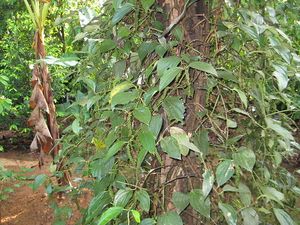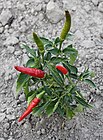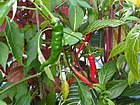Note: This is a project under development. The articles on this wiki are just being initiated and broadly incomplete. You can Help creating new pages.
Difference between revisions of "Capsicum - Pepper"
(→Identification) |
|||
| Line 35: | Line 35: | ||
==Identification== | ==Identification== | ||
===Leaf=== | ===Leaf=== | ||
| − | {{Leaf| | + | {{Leaf|Simple|Lternate|Elliptical to lanceolate, with smooth margins (entire)}}<ref name="Leaf"/> |
===Flower=== | ===Flower=== | ||
| − | {{Flower|Unisexual| | + | {{Flower|Unisexual|Around 1.5 cm, or 1 in, in diameter|White|5|Flowers are borne singly or, rarely, in pairs in the axils (where leaves join stems)}} |
===Fruit=== | ===Fruit=== | ||
| − | {{Fruit| | + | {{Fruit|Vary|Vary|Yellow, orange, red, or purple|The fruits are many-seeded berries--pod-like|many}} |
===Other features=== | ===Other features=== | ||
Revision as of 10:10, 9 April 2020
Capsicum is a genus of flowering plants in the nightshade family Solanaceae. Its species are native to the America. It is used as spices and food vegetables.
Contents
- 1 Uses
- 2 Parts Used
- 3 Chemical Composition
- 4 Common names
- 5 Properties
- 6 Habit
- 7 Identification
- 8 List of Ayurvedic medicine in which the herb is used
- 9 Where to get the saplings
- 10 Mode of Propagation
- 11 How to plant/cultivate
- 12 Commonly seen growing in areas
- 13 Photo Gallery
- 14 References
- 15 External Links
Uses
Cancer, Indigetion, Cold, Cough, Viral infection, Flu, Pimples, Depression.
Parts Used
Chemical Composition
Calcium, Iron, Magnesium, Phosphorus, Potassium, Rutin, Selenium, Sodium, Sulphur, Vitamins A, B-complex, Vitamin C[1]
Common names
| Language | Common name |
|---|---|
| Kannada | |
| Hindi | Shimla mirch |
| Malayalam | |
| Tamil | |
| Telugu | |
| Marathi | NA |
| Gujarathi | NA |
| Punjabi | NA |
| Kashmiri | NA |
| Sanskrit | |
| English | Capsicum, Sweet Pepper |
Properties
Reference: Dravya - Substance, Rasa - Taste, Guna - Qualities, Veerya - Potency, Vipaka - Post-digesion effect, Karma - Pharmacological activity, Prabhava - Therepeutics.
Dravya
Rasa
Guna
Veerya
Vipaka
Karma
Prabhava
Habit
Identification
Leaf
| Kind | Shape | Feature |
|---|---|---|
| Simple | Lternate | Elliptical to lanceolate, with smooth margins (entire) |
Flower
| Type | Size | Color and composition | Stamen | More information |
|---|---|---|---|---|
| Unisexual | Around 1.5 cm, or 1 in, in diameter | White | 5 | Flowers are borne singly or, rarely, in pairs in the axils (where leaves join stems) |
Fruit
| Type | Size | Mass | Appearance | Seeds | More information |
|---|---|---|---|---|---|
| Vary | Vary | Yellow, orange, red, or purple | The fruits are many-seeded berries--pod-like | many | {{{6}}} |
Other features
List of Ayurvedic medicine in which the herb is used
- Vishatinduka Taila as root juice extract
Where to get the saplings
Mode of Propagation
How to plant/cultivate
Bell peppers are warm-season crops and grow best at temperatures between 18 and 30°C (65–86°F)[3]
Commonly seen growing in areas
Photo Gallery
References
External Links
- Ayurvedic Herbs known to be helpful to treat Cancer
- Ayurvedic Herbs known to be helpful to treat Indigetion
- Ayurvedic Herbs known to be helpful to treat Cold
- Ayurvedic Herbs known to be helpful to treat Cough
- Ayurvedic Herbs known to be helpful to treat Viral infection
- Ayurvedic Herbs known to be helpful to treat Flu
- Ayurvedic Herbs known to be helpful to treat Pimples
- Ayurvedic Herbs known to be helpful to treat Depression
- Herbs with Fruits used in medicine
- Herbs with Leaves used in medicine
- Herbs with common name in Hindi
- Herbs with common name in English
- Habit - Herb
- Index of Plants which can be propagated by Seeds
- Herbs that are commonly seen in the region of Temperate area
- Herbs that are commonly seen in the region of Meadows
- Herbs
- Solanaceae






